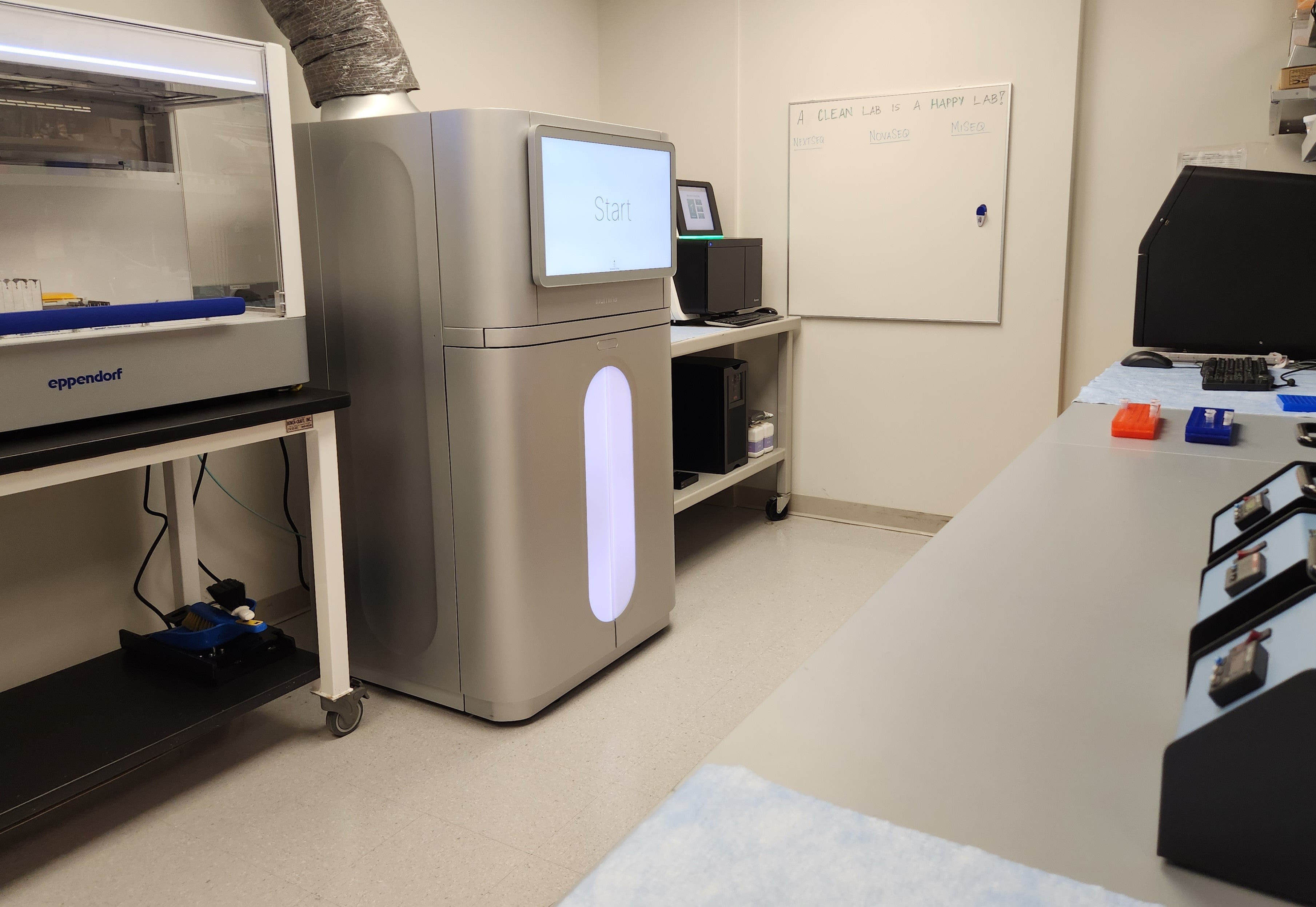Illumina Sequencing
The CWRU Genomics Core offers the highly trusted Illumina platforms for all Next-Gen Sequencing (NGS) services. From amplicon sequencing to sequencing human genomes, the core has an instrument that can fit your project.
| INSTRUMENT | MINIMUM OUTPUT | MAXIMUM OUPUT |
|---|---|---|
| MiSeq | 1M | 25M |
| NextSeq 550 | 130M | 400M |
| NovaSeq X Plus | 1.25B | 25B |
The MiSeq desktop sequencer offers low throughput flowcells and long read lengths. It is best for small whole-genome sequencing, targeted gene sequencing, metagenomics, and CRISPR validation.
The NextSeq 550 has been in use since 2018 and is great for mid-range projects such as exome sequencing, whole-transcriptome sequencing, and epigenetic analysis.
The NovaSeq X Plus instrument is now available and ready for submissions! The 2-channel chemistry, patterned flow-cells are best for large scale genomic, epigenomic, and transcriptome sequencing. With eight individual lanes of 1.25B reads each, users can select to run a shared flowcell or request a full flowcell (10B reads). A shared flowcell will combine multiple projects together and would run when the flowcell is filled.
To set up a consultation for a project, or if you have any questions, please contact the core CWRUgenomics@case.edu.
NGS Run Options & Outputs
View the tables below to determine which platform is best suited for your project.
Mid to High Throughput
| Flow Cell | Cycles | Read Options | # of Lanes | Reads / Lane (M) |
RNA-seq (50M reads) |
Human Exome (40M reads) | Human Genome (400M reads) |
|---|---|---|---|---|---|---|---|
| NVS-X 25B | 300 | PE 150 | 8 | 25,000 | 500 | 600 | 48 |
| NVS-X 10B | 300 | PE 150 | 1 | 1,250 | 24 | 30 | 3 |
| NVS-X 10B | 300 | PE 150 | 8 | 10,000 | 200 | 240 | 24 |
| NSQ HO | 75 | SR 75 | 1 | 400 | 8-12 | x | x |
| NSQ HO | 150 |
SR 150 PE 75 |
1 | 400 | 8-12 | 10 | x |
| NSQ HO | 300 | PE 150 | 1 | 400 | 8-12 | 10 | 1 |
| NSQ MID | 150 |
SR 75 - 150 PE 75 |
1 | 130 | 3 | 3 | x |
| NSQ MID | 300 | PE 150 | 1 | 130 | 3 | 3 | x |
Low to Mid Throughput
| Flow Cell | Cycles | Read Options | # of Lanes | Reads / Lane (M) |
16S (100,000 reads) |
CRISPR Validation | Small Genome (7Mbases) |
|---|---|---|---|---|---|---|---|
| MS v2 Nano | 300 | PE 150 | 1 | 1 | x | 10 | 1 |
| MS v2 Nano | 500 | PE 250 | 1 | 1 | 10 | 10 | 1 |
| MS v2 Micro | 500 | PE 150 | 1 | 4 | 40 | 40 | 6 |
| MS v3 | 150 |
SR 75 - 150 PE 75 |
1 | 25 | x | x | x |
| MS v3 | 600 | PE 250 | 1 | 25 | 192 | 288 | 41 |
| NextSeq MID | 150 |
SR 75 - 150 PE 75 |
1 | 130 | x | x | 384 |
| NextSeq MID | 300 | PE 150 | 1 | 130 | x | x | 384 |
For a list of all runs types available and pricing, please see Pricing.
Sample Submission
If you are submitting gDNA or total RNA for library prep to be completed by the Core, visit our Library Prep page for sample submission requirement and details.
For all submissions of already prepared libraries or final library pools, follow the instructions listed on our Read-made-library page.
Whether prepared by the user or the Core, all final libraries will undergo quality control (QC) prior to running on the Illumina sequencers. The Core will run Qubit for concentration (ng/ul) and Agilent Bioanalyzer High Sensitivity DNA chip for library quality and average fragment size (bp). If samples pass QC, they will be pooled equally and according to adapter-indexes used. The pool will be quantified using the NEBNext Library Quantification kit for Illumina. The final library pool will be diluted and denatured for sequencing following Illumina protocols. All fees for Final Library QC, pooling, and qPCR are separate and not included in the cost of a run. Additional charges to each project vary depending on which QC services are completed.
For a list of all QC tests available and pricing, please see Pricing.


